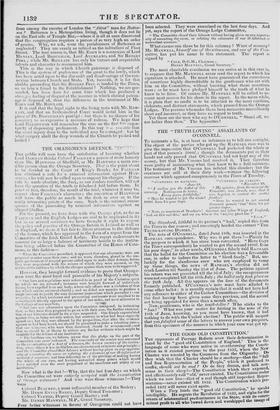THE ORANGMEN'S DEFENCE. - TP - ' 7- 1" .
THE public will soon have the satisfaction of knowing whether Lord DENMAN thinks Colonel FAIRMAN a person of more honesty than Mr. HAYWOOD of Sheffield, or Mr. HAI-wool) a more cre- dible person than the Orange Secretary. That is the.point about to be decided in the Court of King's Bench; for FAIRMAN has obtained a rule for a criminal information against HAY- wool., who will now be called upon to support his charges. If the rule be made absolute, the Jury, as our readers recollect, will not have the question of the truth or falsehood laid before them. In point of fact, therefore, the result of the trial, whatever it may be, cannot clear FAIRMAN'S character ; the conviction of Haywoon will leave the public as much in the dark as ever as to the really interesting points of the case. Such is the rational cense- (mlee of the proceeding by criminal information against an alleged libeller.
For the present, we have clone with the Orange plot, as far as FAIRMAN and the English Ledges are said to be implicated in it; but as on several occasions we have thought it right to expose the policy and practice of the Orange faction in Ireland as well as in England, we deem it but fair to direct attention to the defence of the former, which has appeared in the form of a report from the Ceannittee of the Irish Grand Lodge. The report endeavours to account 14 so large a balance of testimony hostile to the institu- tion being adduced before the Committee of the House of Com- mons, in this fashion- " When the Committee assembled, it appeared that our adversaries were not prepared to enter upon their ease; and we were, therefore, placed in the sin- gular predicament of accused persons called upon to make their defence, befiwe they acre acquainted with the crimes of which they were accused, or the nature of the evidence by which the charges against them were to be supported.''
However, they brought forward evidence to prove that Orange- men were the most loyal and peaceable of his Majesty's subjects.
" The brethren are, we believe, aware that this pledge on the part of the Committee teas never redeemed. The remainder of the session was consumed in the ex, initiation of a host of witnesses, the known enemies of theinstitu- Min,e object it was to blacken our characteraud criminate our principles ; "tut the t'mantittee closed their labours without having given us any opportu- nity tf correcting the error or refuting the calumnies of our ill-informed or nuilevoltmt accusers; and thus debarring us of the privilege of making known the whole of our case, and leaving untouched many points which would have satisfied even the most prejudiced of the excellence and utility of our institution." Now what is the fact ?—Why, that the last four days on which the Committee sat. were entirely occupied with the examination 0/' rang.e witnesses! And who were those witnesses P—They were Colonel BLACKER, a most influential member of the Society ; Mr. Iluott llyvEs BAKER, Deputy Grand Treasurer ; Colonel VERNER, Deputy Grand Master; and Mr. HENRY MAXWELL, M.P., Grand Secretary. Four better witnesses in favour of Orangeism could not have been selected. They were examined on the last four days. And yet, says the report of the Orange Lodge Committee, " The Committee closed their labours without having given us any opportu. nity of correcting the error, or refuting the calumnies of our ill.infortued or malevolent accusers." What excuse can there be for this calumny ? Want of memory? Mr. MAXWELL, himself one of the witnesses, and one of the Com- mittee, has put his name to this statement. The report is signed by " COLE, D.G.M., Chairman ; HENRY MAXWELL, Grand Secretary." The most charitable conclusion we can arrive at in this case is, to suppose that Mr. MAXWELL never read the report to which his signature is attached. He must have guaranteed the correctness of assertions highly discreditable to the gentlemen who sat with him on the Committee, without knowing what those assertions were ; or he must have pledged himself to the truth of what he knew to be false. Of course Mr. MAXWELL will be called to ac- count next session for his share in the report. In the mean while, it is plain that no credit is to be attached to the most cautious, elaborate, and distinct statements, which proceed from the Orange Lodges. The persons whomake them have memories marvellously short and incorrect, or they have no regard to truth. Yet these are the men who say to O'CONNELL, " Stand off, we are holier than thou." The hypocrites !


























 Previous page
Previous page